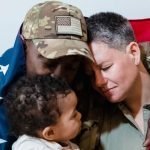Can a grown child of a veteran get benefits? It’s a question many families ponder as they navigate the veteran support programs. While much attention is rightfully given to benefits for veterans themselves, their dependents often have needs too, even as they grow older. Let’s examine the scenarios where a grown child might be eligible for veterans’ benefits, so you’re informed about the options available.
Military service often comes with significant sacrifices that impact a veteran’s loved ones. The U.S. government offers a range of benefits to address these sacrifices, some designed specifically for grown children. But can a grown child of a veteran get benefits? The answer depends on various factors, such as disability status, the veteran’s cause of death, and educational pursuits.
Table of Contents:
- Benefits for Grown Children of Deceased Veterans
- Benefits for Grown Children of Disabled Veterans
- Special Cases: Camp Lejeune and Children of Women Vietnam Veterans
- Important Eligibility Factors and Considerations
- FAQs about Can a Grown Child of a Veteran Get Benefits?
- Conclusion
Benefits for Grown Children of Deceased Veterans
When a veteran passes away, their children might be eligible for various benefits, particularly if the death was related to their military service. Below, we break down some vital support systems available in such situations. These programs provide financial assistance, educational opportunities, and other forms of support to help surviving family members.
Dependency and Indemnity Compensation (DIC)
One of the most significant benefits is Dependency and Indemnity Compensation (DIC). This monthly, tax-free payment is available to surviving spouses, children, and even parents of service members who died on active duty, or veterans whose death resulted from service-connected injuries or diseases.
While minor children usually qualify, adult children have additional stipulations. To qualify for DIC as an adult child, you must be unmarried and have become permanently incapable of supporting yourself due to a disability before turning 18. This often requires a formal determination of “helpless child” status from the Social Security Administration. Alternatively, eligibility extends to unmarried children aged 18 to 23 if enrolled full-time in a VA-approved educational program.
In 2019, data from VA.gov showed 453,000 DIC recipients, with 3% of these being surviving children. The significance of this support can’t be understated for those who qualify, helping to address financial strain during challenging times.
Survivors’ and Dependents’ Educational Assistance (DEA)
The Survivors’ and Dependents’ Educational Assistance (DEA) program helps dependents of veterans who died in service or have a service-connected disability by providing assistance for education and training. This benefit, available from age 18 up to 26, can help put surviving family members on a path toward a secure future.
Funds can go towards degree and certificate programs, apprenticeships, and on-the-job training at VA-approved institutions. Learn more about Survivors’ and Dependents’ Educational Assistance on the VA website.
The Fry Scholarship
The Fry Scholarship is designed for surviving spouses and children of service members who died in the line of duty after Sept. 11, 2001. It offers comprehensive education and training support comparable to the Post-9/11 GI Bill, covering tuition and living expenses.
To explore this valuable option, visit the Fry Scholarships page on the VA website.
Benefits for Grown Children of Disabled Veterans
Even when a veteran doesn’t pass away, certain benefits can extend to grown children if the veteran has a service-connected disability. Recognizing the long-lasting impact of those disabilities is important, and support systems for both the veteran and their family are essential.
CHAMPVA
CHAMPVA stands for the Civilian Health and Medical Program of the Department of Veterans Affairs. This program helps share health care costs with eligible beneficiaries, including spouses, children, and some disabled adult children.
You may qualify for CHAMPVA if the veteran has a permanent and total disability tied to their service or died due to a service-related condition. For detailed information on eligibility and coverage, explore the CHAMPVA: Civilian Health and Medical Program page.
Transferring Unused Post-9/11 GI Bill Benefits
In some cases, veterans with unused Post-9/11 GI Bill benefits have the option to transfer these benefits to their spouse or children. This transfer, which requires approval from the Department of Defense, can provide up to 36 months of valuable educational support, including tuition, books, supplies, and housing costs.
Visit the VA’s Transfer your Post-9/11 GI Bill benefits page for information on the process.
Additional Considerations for Grown Children
Beyond these specific programs, adult children may benefit from additional support related to their parent’s veteran status. State-sponsored programs for children of veterans, for example, may offer financial assistance or educational benefits. These resources might target specific groups like children pursuing higher education or vocational training.
Local veteran service organizations (VSOs) and community support groups can also prove invaluable. You can find certified VSOs through the VA’s accreditation app. These networks provide practical support, emotional understanding, and a sense of belonging within the broader veteran community.
Adult children caring for a disabled veteran parent might benefit from respite care and support programs. These programs, available through the VA, alleviate some burdens associated with providing care, enabling better balance in their own lives. For details on these programs, visit the VA’s Family and Caregiver Benefits page.
Special Cases: Camp Lejeune and Children of Women Vietnam Veterans
Some benefits are available to children exposed to unique situations during their parent’s service. These benefits highlight the lasting impact of certain historical events.
Camp Lejeune
If your parent was stationed at Camp Lejeune in North Carolina for at least 30 consecutive days between August 1953 and December 1987, you might be eligible for the Camp Lejeune Family Member Program. Water contamination at the base during that time posed a serious health risk.
If you experience illnesses linked to the contamination (like leukemia, bladder cancer, or kidney cancer), you might qualify for VA health care coverage and financial assistance. Further details can be found on the VA’s Camp Lejeune Family Member Program page.
Children of Women Vietnam Veterans
The VA offers benefits to children born to women who served in Vietnam, as exposure to various environmental factors led to increased health risks for mothers and children. This dedicated program focuses on the well-being of children with birth defects linked to their mother’s service in Vietnam. It offers treatment through the VA healthcare system. You can explore this further on the VA’s Birth Defects page.
Important Eligibility Factors and Considerations
Navigating the eligibility requirements for these programs can be complex, particularly when it comes to the term “grown child.” Different programs have distinct age limitations and definitions.
Additionally, many benefits depend on whether a veteran’s death was service-connected or whether a disability is officially recognized as being caused or aggravated by military service. The VA considers these connections when determining eligibility.
To clarify your eligibility, consult with a Veterans Service Officer (VSO), an attorney specializing in veterans’ benefits, or utilize online resources provided by the Department of Veterans Affairs (VA). They can offer guidance and help you secure the necessary documentation for a successful application process.
FAQs about Can a Grown Child of a Veteran Get Benefits?
Do grown children of veterans get any benefits?
Yes, grown children of veterans can potentially receive benefits, but specific program eligibility varies. Benefits like Dependency and Indemnity Compensation (DIC), Survivors’ and Dependents’ Educational Assistance (DEA), CHAMPVA, and the Fry Scholarship might be available, depending on factors like:
- The veteran’s death or disability status.
- The child’s age and disability status.
- Other criteria.
Consult with a Veterans Service Officer (VSO) or a specialist in veterans’ benefits to clarify specific eligibility requirements.
What is the VA 10-year rule?
The VA 10-year rule dictates that for a surviving spouse to be eligible for DIC, the veteran must have had a 100% disabling, service-connected condition for at least ten years before their death.
If the veteran was rated totally disabled for a continuous period totaling ten years or more before death, even with intermittent periods of less than 100% disability, the spouse might qualify for DIC. The rule helps ensure a strong connection between a veteran’s service-connected disability and their death.
What is the VA 67-year-old rule?
While there isn’t an official “VA 67-year-old rule,” reaching age 65 holds significance for veterans seeking pension benefits. The VA offers a non-service-connected pension to wartime veterans who meet specific income and disability criteria.
When a veteran turns 65, the VA generally presumes them permanently and totally disabled, making them eligible to apply for this pension. The presumption helps simplify the process, particularly for veterans whose health declines as they age.
Can an adult child of a veteran get a military ID?
Generally, adult children of veterans are not eligible for a military ID. Such IDs are typically reserved for active-duty service members, reservists, retirees, and certain dependents like spouses and unmarried children under 21 (or under 23 if attending an accredited college full-time).
However, specific exceptions might exist, such as exceptions for disabled adult children under continuous VA care. Contacting the ID Card Office at a nearby military installation or a VSO can clarify your situation. The DoD website also offers an overview of military identification on its Common Access Card (CAC) page.
Conclusion
Can a grown child of a veteran get benefits? The answer often depends on several factors. While not every adult child will qualify for every benefit, exploring potential support options remains crucial. Resources exist, spanning from financial assistance through DIC, educational opportunities like the DEA and Fry Scholarship, and healthcare coverage via CHAMPVA.
It’s about understanding the unique circumstances surrounding each case and seeking information from reliable sources like the VA or professionals knowledgeable in veteran benefits. By being proactive and persistent, grown children of veterans can access support when facing specific needs.


If online help is available for this subject, internet links would be greatly appreciated! I have a grown daughter who was born with Cerebral Palsey, and could really benefit from financial help! I live quite a ways from a military installation and online help would be greatly appreciated!!!